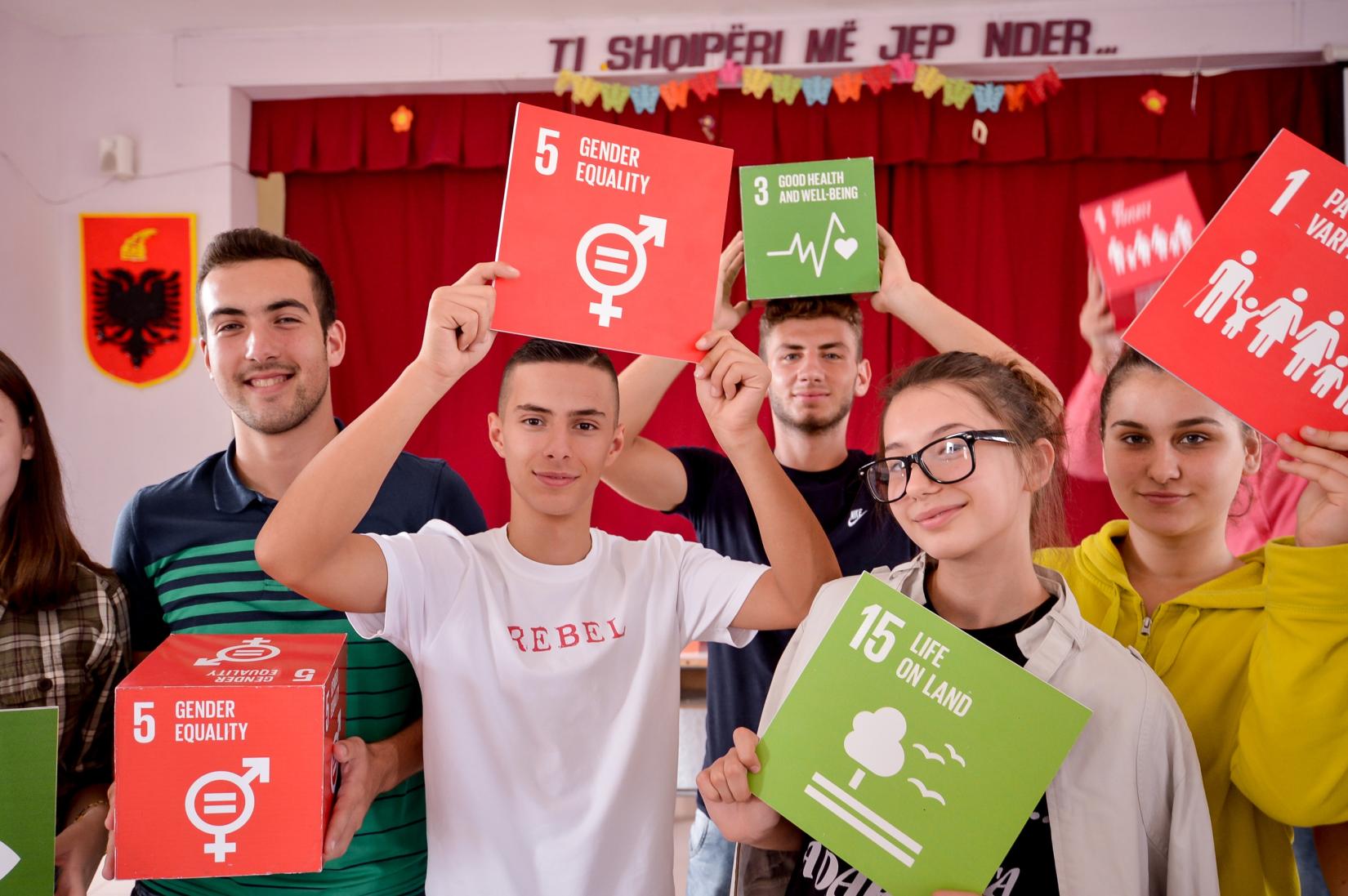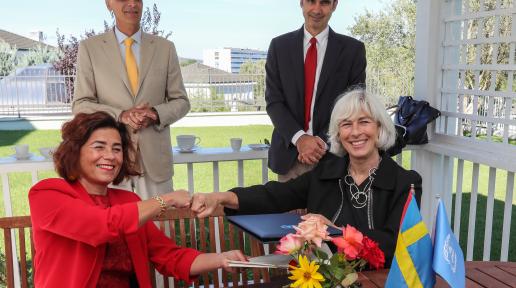Albania has been a Delivering as One country since its pilot phase started in 2007 and has completed two One Programmes during 2007-2016. Implementation of "One UN" at the country level has increased harmonization, efficiency and collaboration among UN agencies while maintaining their distinct focus and agenda. The goal of the One UN Programme in Albania is to enhance development results and impact by bringing together the comparative advantages of the UN system within a single strategic programme and to contribute to making a difference in the lives of Albanians. The UN system support is complemented by the assistance provided by other multilateral and bilateral development partners. In partnership with the Government and other development stakeholders in civil society and private sector, the UN system delivers focused and value-added results in development assistance as a harmonized organization with unity of purpose, coherence in management and efficiency in operations.
The current Albania-United Nations Sustainable Development Cooperation Framework (UNSDCF) 2022-2026 is under implementation in support of Albania’s development and EU integration goals and achievement of the Agenda2030.
The 2030 Agenda calls for integrated approaches across multiple sectors and goals, as well as collective action at all levels in order to achieve the Sustainable Development Goals (SDGs). In response to this request, the “SDG Acceleration Fund”, a joint Government of Albania and United Nations development cooperation funding mechanism is established to support integrated and multidimensional sustainable development activities for Albania’s achievement of Sustainable Development Goals as part of ‘Agenda 2030 for Sustainable Development’ in full respect for human rights and promoting gender equality and women’s empowerment as of fundamental importance with multiplier effect for achieving sustained and inclusive economic growth, poverty eradication and sustainable development as required by the UN GA Resolution 71/243[1].
The SDG Acceleration Fund aims to advance the 2030 Agenda by contributing to accelerated progress in achieving national sustainable development goals through providing catalytic support to priority areas of SDG achievement in the framework of the National Strategy for Development and Integration 2015-2020 and the PoCSD 2017-2021 as well as supporting processes around SDGs (monitoring, reporting). Actions financed by the Albania SDG Acceleration Fund will (a) result in an evidence-based understanding – by the Government and the general public - of Albania's progress towards achieving the SDGs through its national strategies and the EU integration process and (b) accelerate the rate of achievement of SDGs so that all are attained by 2030.
The SDG Acceleration Fund is one of the Government’s preferred funding modalities for achievement of SDGs in the country, to attract funding with all stakeholders acting in partnership that will serve to the intended impact of this fund. For more information on the vision, objectives, and capitalization.
The Albania SDG Acceleration Fund is administered by the Multi-Partner Trust Fund Office (MPTF Office) of the United Nations Development Programme (UNDP) in accordance with its financial regulations and rules.
Assistance Strategy
The Albania One UN Programme of Cooperation for Sustainable Development builds on the areas of intervention of the UN Development Assistance Framework (UNDAF) 2017-2021 agreed between the Government of Albania and participating UN Agencies. Following close consultations with the Government of Albania and other national and international stakeholders and building on priority areas of the UNDAF, it was agreed that under the One UN, impact and development effectiveness will be improved in the following areas:
- Governance and Rule of Law
- Social Inclusion (Health, Education, Social Protection & Inclusion, Child Protection and GBV)
- Economic Growth, Labour, and Agriculture
- Environment and Climate Change
In all four priority areas, the core principles of gender equality and development of national capacity are upheld and incorporated throughout the implementation process.
The One UN Programme is implemented in a collaborative manner under the strategic leadership of the Government of Albania and the UN Resident Coordinator. The UN Resident Coordinator provides leadership and coordination throughout the programming process as the One UN Leader. Prioritization of the funding allocation is determined jointly by the Government, the UN Resident Coordinator and the Participating UN Organizations through the Joint Executive Committee.
Governance
The Programme of Cooperation for Sustainable Development (PoCSD) 2017-2021 is nationally executed under the overall co-ordination of a Joint Executive Committee (JEC) chaired by the Deputy Prime Minister and the UN Resident Coordinator. In order to ensure effective ownership over the Programme, the government authorities are involved at all levels of management structures.
UN Joint Executive Committee (JEC)
The Joint Executive Committee provides strategic guidance and oversight over the programme. The JEC is co-chaired by the Deputy Prime Minister and the UN Resident Coordinator. The JEC meets at least once a year with the participation of Ministers, Prime Minister’s Office and UN Country Team members and reports to the GoA Strategic Planning Committee. In addition, the JEC will be convened on a regular basis under the leadership of the Director of Development and Good Governance (DDGG) and the UN Resident Coordinator (UNRC). Members are representatives from line Ministries, heads of the participating UN agencies, or authorized representatives. The JEC is responsible for reviewing and approving funding priorities, prioritizing and approving the allocation of resources mobilized through the Albania SDG Acceleration Fund and oversight of the Fund's management and operations. A set of Fund Allocation Criteria guide the JEC. The Government jointly with the Resident Coordinator, through the JEC makes the final decisions on fund allocation based upon a well documented rationale.
Outcome Groups
Outcome Groups (OGs) are mechanisms intended to contribute to specific PoCSD outcomes through coordinated and collaborative planning, implementation, monitoring and evaluation. They are defined at the strategic planning stage and are aligned to the PoCSD results matrix. They advise the JEC and UNCT, as appropriate, on opportunities and challenges linked to PoCSD implementation, specific programme management issues, and they coordinate training for staff and national partners. The OGs also support knowledge management initiatives and supply the Communications Team (see below) with results information. Outcome Groups are led by Ministers or designated representatives from the line-Ministries involved in the PoCSD and two Outcome Co-Chairs, who are Heads of Agencies and members of the UNCT. The Outcome Groups are comprised by UN Output Working Groups with the participation of the development partners that contribute to the specific outcome.). There are four OGs under this PoCSD (2017-2021).
Resident UN Coordinator (RC) and UN Country Team (UNCT)
The RC provides strategic leadership and coordination throughout the programming process as the One UN Leader. The RC jointly with Government as a member of the JEC reviews strategic annual work plans and approves fund priorities and ultimately makes decisions on the fund allocation. The UNCT, chaired by the Resident Coordinator, functions in a collegial and participatory manner. In the context of the One UN Programme and envisaged UN reforms, the UNCT engages in dialogue on reform and development priorities for Albania. The UNCT has designated substantive leadership to agencies for each of the One UN Programme outcome and thematic areas.
Administrative Agent (AA)
The UNDP Partner-Donor Trust Fund Office (MPTF Office) has been appointed the Administrative Agent (AA) of the Albania SDG Acceleration Fund. The AA's functions include receipt, administration and management of contributions from Donors; disbursement of such funds to the Participating UN Organizations in accordance with the approved Annual Work Plans/Programmatic Documents; provision of consolidated narrative and financial reports, in accordance with the MOU, on the Albania SDG Acceleration Fund Account to the Resident Coordinator based on reports of the Participating UN Organizations. Some of the AA functions had been delegated to the UNDP Country Director in the Albania until 31 Dec 2017.
Output Working Groups (OWGs)
Output Working Groups (OWGs) are a key mechanism to support the work of the Outcome Groups. OWGs are technical committees comprised of representatives of Implementing Partners, including partners from civil society, and UN Agencies responsible for the achievement of one or more specific outputs that contribute to outcomes in the PoCSD. The OWG are organized around the outputs defined in the rolling Outcome-tied JWPs. The OWG is co-chaired by technical experts from the GoA and the UN. The UN chair is proposed by the UN members of the OWG and elected by the Outcome Groups for a term of one year. They are expected to provide technical support to the Outcome Co-Chairs. The Outcome chair’s agency provides secretariat support for the year.
Decision-Making Process
Eligibility
All Participating UN Organizations that have signed the PoCSD (2017-2021) and Memorandum of Understanding are eligible to receive funds under the Albania SDG Acceleration Fund given that it contributes towards the achievement of result areas in the One UN Results Framework and that the agency has the specific mandate and required capacity.
Implementing Partners such as NGOs involved in the Common Operational Document will have access to the Albania SDG Acceleration Fund through the Participating UN Organizations. The Participating UN Organizations will utilize their standard NGO cooperation modalities for this purpose and charge the corresponding direct and indirect costs to the Albania SDG Acceleration Fund on the basis of its financial regulations and rules.
Funding Partners:
Government of Sweden
Government of Switzerland
Government of Netherlands
Government of Albania
Government of Norway
Government of Spain
Expanding DAO Funding Window
European Union
Government of Denmark
Government of the United Kingdom
Government of Austria
Government of Finland
Detailed information can be found HERE
[1] Quadrennial comprehensive policy review of operational activities for development of the United Nations system






















